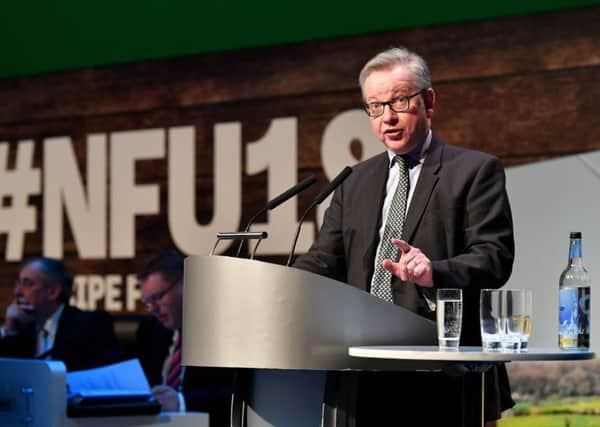Gove promises farmers they fit in with his environment agenda


Speaking at the National Farmers’ Union’s annual conference, Mr Gove insisted that farming is more central to government thinking than at any other time over the last 50 years, as he assured farmers that his ‘green’ agenda to drive environmental enhancements in a way EU-dictated policy could not is compatible with food production.
A consultation paper will be published soon to outline the government’s draft plans for a future farming policy, he said, including “a clear direction of travel on how we can better deliver support for farmers”.
Advertisement
Hide AdAdvertisement
Hide AdDuring his speech, Mr Gove said: “I appreciate everything farmers do to keep our soils rich, our rivers clean, to provide habitats for wildlife and to help in the fight against climate change and broader environmental degradation. And I want to see farmers better rewarded for these vital public services.
“But farmers would not be in a position to provide these public goods, indeed we would not have the countryside we all cherish, without successful, productive, profitable farm businesses.”
The Secretary of State did admit that any new system of financial support would need time and the industry’s input to get right, but that it would be progressively based on the delivery of “public goods” rather than direct support payments. The most important public good that taxpayers’ money should be used to secure is environmental protection and enhancement, he said.
Mr Gove said: “The more we can support local food economies where farmers and growers provide fresh produce to local retailers, the more we can ensure supermarkets and others pay fair prices for fresh British produce, the more children in school learn to buy wisely, cook properly and eat healthily and the more public procurement values fresh, healthy, British food, the better for all our health.
Advertisement
Hide AdAdvertisement
Hide Ad“That is why I believe the money we spend, as a country, supporting healthy food production is an investment not an expenditure, a way of reducing significant future costs not an enduring burden on the exchequer.”
He said he wanted future funding to be allocated in a way which also commands “enduring public support and delivers productivity and innovation breakthroughs that individual farmers could not secure on their own.
Mr Gove added that he was acutely aware that the forthcoming changes had left smaller upland farmers particularly worried and that future financial support arrangements should recognise how critical it is to value the culture in agriculture.
“Cumbria and Northumberland, Yorkshire’s Dales and Pennine Lancashire would not be as they are - both as breathtakingly beautiful and as resilient - without upland farmers,” Mr Gove said.
FARM INSPECTIONS TO BE REVIEWED
Advertisement
Hide AdAdvertisement
Hide AdMichael Gove also used today’s keynote speech to announce a “thorough and comprehensive” review into simplifying England’s overly bureaucratic farm inspection regime will be carried out by former chief executive of Animal Health, Dame Glenys Stacey.
The inspection regime remains “as unwieldy as ever” despite several recent attempts at simplification, Mr Gove said, due to a “barrage” of inspections from different agencies that duplicate costs in both time and money.
He also promised to use Brexit to improve government procurement of British food and said environmental or animal welfare standards will not be lowered as part of any new trade deals.
He also said that special account has to be taken of the needs of agriculture to access foreign labour as part of any transitional period after Britain formally leaves the EU next year.